|
Printables |
PowerPoints |
Online exercises |
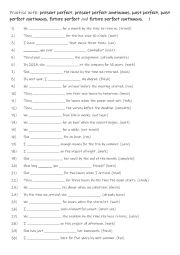
|
B1+-C1 Practise with: present perfect, present perfect continuous, past perfect, past perfect continuous, future perfect and future perfect continuous. 1
Students at the B1+ to C1 level should practise the present perfect, present perfect continuous, past perfect, past perfect continuous, future perfect, and future perfect continuous tenses to enhance their ability to express complex ideas and time relationships. These tenses help them discuss actions with relevance to the present, ongoing or comple...
Level: intermediate
Age: 10-100
Type:
Downloads: 118
|
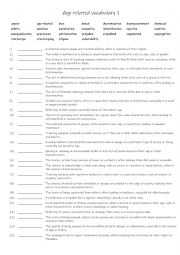
|
B1+-C1 Age related vocabulary 1
Learning age-related vocabulary equips students to recognise and discuss biases such as ageism, stereotyping, and discrimination, fostering greater awareness of the challenges faced by different age groups. Words like marginalisation, isolation, and vulnerability encourage empathy by highlighting the social and emotional impact of age-related inequ...
Level: intermediate
Age: 11-100
Type:
Downloads: 118
|
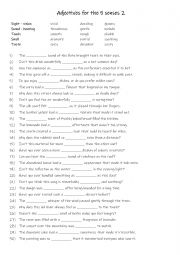
|
A2+-B1 Adjectives for the 5 senses 2
Students should learn adjectives for the five senses (sight, sound, touch, smell, and taste) because they enhance descriptive language and make communication more vivid and engaging. Using specific adjectives like vivid or gloomy for sight, melodic or thunderous for sound, and smooth or rough for touch allows students to convey precise impressions ...
Level: intermediate
Age: 9-100
Type: worksheet
Downloads: 118
|
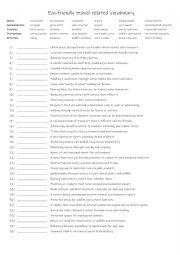
|
A2+-B1 Eco-friendly travel related vocabulary
First, students need to familiarise themselves with the 36 words and their meanings. Then they read the definitions to see which one is being described and write that word in the space provided Answers on page 2.
Level: intermediate
Age: 9-100
Type:
Downloads: 118
|
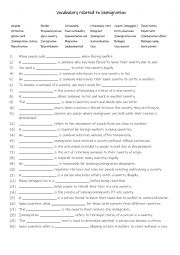
|
B1+-B2 Vocabulary related to immigration
Students familiarise themselves with the 30 words and their meanings, then they read the definitions to work out and write in the space provided which one is being described. Answers on page 2.
Level: intermediate
Age: 10-100
Type:
Downloads: 118
|
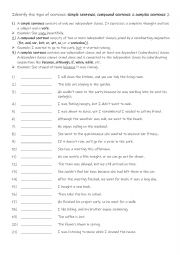
|
A2 Identify the type of sentence simple sentence, compound sentence & complex sentence 2
Students should learn to identify simple, compound, and complex sentences because it helps them write with more variety, organise ideas clearly, understand reading texts more easily, prepare for future learning, and communicate their thoughts more accurately. Each type is used 7 times. Answers on page 2.
Level: elementary
Age: 9-100
Type:
Downloads: 118
|
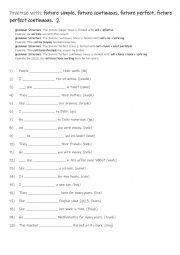
|
A2-B1 Practise with future simple, future continuous, future perfect, future perfect continuous. 2
Students familiarise themselves with the 4 tenses and their formation and use. Then they read the sentences to see which one is needed to complete the sentence using the given verb in (). Each form is used 5 times! Answers on page 2.
Level: elementary
Age: 10-100
Type:
Downloads: 118
|
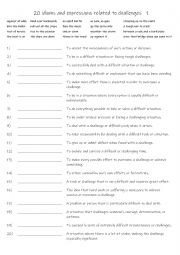
|
B1+-C1 20 idioms and expressions related to challenges 1
First, students need to familiarise themselves with the 20 idioms and expressions and their meanings. Then they read the definitions to see which one is being described and write that word in the space provided Answers on page 2.
Level: intermediate
Age: 12-100
Type:
Downloads: 118
|
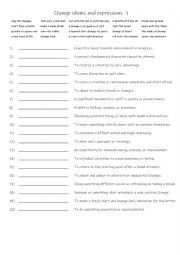
|
B1+-C1 Change idioms and expressions 1
First, students need to familiarise themselves with the 20 idioms and expressions and their meanings. Then they read the definitions to see which one is being described and write that word in the space provided Answers on page 2.
Level: intermediate
Age: 12-100
Type:
Downloads: 118
|
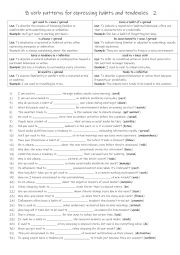
|
A2+-B1+ 8 verb patterns for expressing habits and tendencies 2
First, students need to familiarise themselves with the 8 verb patterns and their formation and use. Then they read the sentences to work out which one is needed to complete the gap-fill. Each verb pattern is used 4 times!
Level: intermediate
Age: 12-100
Type:
Downloads: 118
|
|
|
|
|












